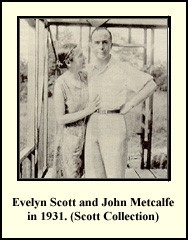Evelyn Scott
 Novelist
Novelist
1893-1963
By Arian Finley
Evelyn Scott was born Elsie Dunn in Clarksville, TN in 1893. This would by no means tie the often-overlooked author to the traditional beliefs and values of typical Southerners of her time. Well-learned through self-teachings and private tutors and with access to many resources, she was greatly inspired by philosophers and scholars such as Tolstoy, Nietzsche, Bergson, and Marx. As a youth, she held very controversial beliefs. She had interest in writing, and used her writings to advocate fair treatment for blacks, poor people, and women.
At 16, she moved to New Orleans with her family, where she published her first story in the New Orleans Times-Picayune under pen name Hiram Hagen Beck. She studied Arts at Sophie Newcomb College. Eventually, in 1913 she stirred up even more controversy, by marrying the dean of the School of Tropical and Preventive Medicine at Tulane University, Frederick Creighton Wellman. Dunn and Wellman changed their names to Evelyn Scott and Cyril Kay-Scott respectively and left New Orleans for England, before they took residence in Brazil. In 1914, Evelyn Scott would give birth to a son they named Creighton. She returned to the United States in 1919 and published Precipitations, her first collection of Poetry. The Narrow House (1921) and The Wave (1929) would secure her place as a literary figure. The Wave was especially praised as one of the most well written novels on the Civil War.
Scott takes notice in her book, Background in Tennessee, that most of her time and writing had been spent outside the United States, having traveled between England, Bermuda, France, and North Africa. During her travels, she and her husband divorced in 1928. In 1931, she married John Metcalfe and settled in the continent, between the United States and Canada.
Scott’s reputation began to decline when people began analyzing and disagreeing with the philosophical nature of her work. In 1952, Scott and Metcalfe moved to California, where they attempted to revitalize their reputation. Even with a stroke, which caused aphasia, Scott still continued writing, although none of her works were published. In 1963, she passed away in her sleep. Only after her death, is Evelyn Scott once again beginning to gain the recognition she deserves as a modernist who experimented with imagism, expressionism, and stream of consciousness writing.
Photo Credits: UT Libraries


